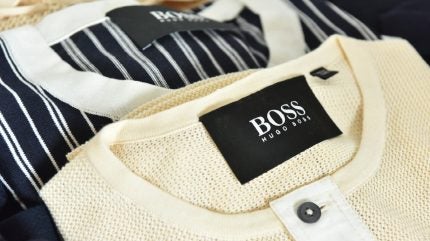
The new entity, fully owned by Hugo Boss, will operate in line with the brand’s dedication to environmentally conscious and resource-efficient production methodologies.
Set to commence operations in January 2025, the new venture will be spearheaded by Marketa Miltenberger, serving as director, alongside Placido Klitzke as co-director.
Both Miltenberger and Klitzke have been promoted from within Hugo Boss to lead Eightyards, which will operate from Metzingen, Germany.
Miltenberger brings over 15 years of experience working in operations and supply chain management within the fashion industry. Miltenberger previously held the position of vice president of product excellence for outerwear, coats, and leather garments at Boss.
Klitzke served as the team leader for global brand (product) management at Hugo Menswear.
“The mission of the company over the coming years is to establish itself as one of the key facilitators for the recycling and reuse of surplus materials (e.g. fabrics) into various industries beyond fashion,” Hugo Boss said in a statement.

US Tariffs are shifting - will you react or anticipate?
Don’t let policy changes catch you off guard. Stay proactive with real-time data and expert analysis.
By GlobalDataThe inception of Eightyards is pivotal for Hugo Boss in realising its aspirations for climate neutrality and moving its sustainability agenda forward. This is in line with the company’s goal to achieve climate neutrality by 2030 and extend this ambition across its entire value chain by 2045.
Last month, Hugo Boss reported a modest revenue increase of 1% during the third quarter (Q3) of 2024, despite persistently subdued demand in China. The company’s earnings before tax (EBIT) saw a decline of 7% to €95m ($99.69m) for Q3, mitigated by stringent cost management strategies.
According to its sustainability report 2023, Hugo has set forth ambitious goals for the coming decade, aiming for 80% of its apparel products to be circular by 2030. The company also plans for more than 90% of its product development to be conducted digitally by 2025.
Furthermore, by 2030, Hugo intends to source all natural materials from either regenerative agricultural practices or closed-loop recycling systems. It also plans to eliminate the use of polyester and polyamide in all products by 2030 by actively seeking out and using viable alternatives to synthetic fibres such as HeiQ, AeoniQ.
In line with these objectives, Hugo has targeted a reduction of its CO2 emissions by 50% relative to its 2019 levels by the year 2030.
In pursuit of its sustainability goals, particularly in combatting microplastic pollution and achieving zero emissions, Hugo Boss partnered with Swiss innovation firm HeiQ.
AeoniQ yarn, derived from renewable cellulose sources, is being positioned as a substitute for traditional polyester and polyamide fibres. It introduced two polo shirts by the BOSS brand crafted with AeoniQ yarn.
In October this year, the Hugo Boss Foundation pledged a €500,000 ($524,000) donation over three years to support a regenerative food and cotton fibre project in the tribal villages of the Eastern Ghats in Andhra Pradesh, South India.



